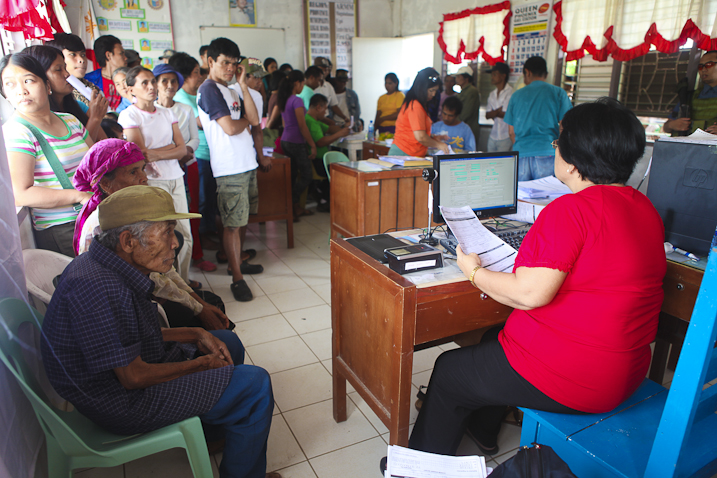
By CAROLYN O. ARGUILLAS, MindaNews
DAVAO CITY — A total of 1.56 million persons trooped to voters’ registration centers in the five-province, two-city Autonomous Region in Muslim Mindanao (ARMM) from July 9 to 18, a figure that is just 200,000 lower than before the Commission on Elections annulled the heavily-padded voters’ list in June.
But Comelec spokesperson James Jimenez told MindaNews Sunday that the figure will “likely” go down to 1.1 or 1.2 million after the list is rid of multiple and underage registrants.
The Comelec had earlier projected that the new voters’ list in the ARMM would be around 1.1 or 1.2 million. The region has 1.88 million voters, according to the Comelec website but a June 15 press release issued by the poll body’s Education and information Department said the region had 1.77 million.
But Comelec statistics posted on its website showed the ARMM had 1,882,338 registered voters in the May 2010 polls: 280,459 in Basilan; 515,485 in Lanao del Sur; 651,692 in Maguindanao; 315,104 in Sulu; 169,598 in Tawi-tawi.
Jimenez said a total of 1,586,409 signed up for registration during the ten-day period: 155,831 in Basilan; 439,782 in Lanao del Sur; 536,356 in Maguindanao; 300,611 in Sulu and 135,829 in Tawi-tawi.
Congress’ Joint Resolution 3, passed by both Houses in May and approved by President Benigno Simeon Aquino on June 11, annulled the Book of Voters of the ARMM and directed the Comelec to immediately conduct a new general registration of voters in the region.
The Joint Resolution noted that data from the National Statistic Office indicate bloated population figures in the ARMM “that would suggest that the voters’ lists in the region were padded.”
It said that while the population in the ARMM was 4.1 million in 2007, a revalidation by the NSO in 2010 revealed its population was “only a little more than 3.3 million.” It also noted that while the country’s population excluding ARMM, grew by just 1.89 percent between 2000 and 2007, ARMM reported a population growth rate of 5.46 percent, with Maguindanao at 6.6 percent and Basilan at 6.44 percent.
The Resolution also noted that the Comelec had admitted publicly the presence of “hundreds of thousands of illegal and fictitious registrants in the ARMM which need to be deleted from the Book of Voters.”
It added that the anomaly in the ARMM, also repeatedly referred to as the country’s “cheating capital” during elections, has national ramification because the so-called “ghosts” or “fictitious and double (some are triple) registrants constitute the so-called ‘command votes’ or ‘controlled votes’ wielded by political warlords that could decide the winner not only in local but most importantly the national elections.”
The 10-day re-registration was generally peaceful but reports of underage residents lining up to register were persistent, as persistent as the reported “hakot” (hauling) of voters from neighboring areas outside the ARMM or from one town to another from within the same province.
On July 11, the third day of the voters’ registration, OIC ARMM Governor Mujiv Hataman acknowledged the problems but urged “everyone, civil society” and election monitors to file complaints before the Election Registration Board (ERB).
According to the Comelec’s schedule, the last day for posting the notice of hearing with lists of applicants is on July 31 while the last day to file opposition to application for registration is on August 6. Hearing and approval or disapproval of application for registration is from August 13 to 17.
After the ERB hearings, when the data shall have been consolidated, they will be forwarded to Manila for matching with other registered voters nationwide, through the Automated Fingerprint Identification System or AFIS.
(ARMM WATCH is a project of VERA Files in partnership with MindaNews, The Asia Foundation and Australian Agency for International Development.)